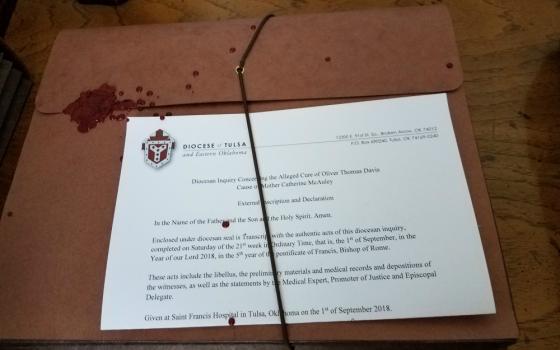Sometimes people ask me about the experience of serving as the vice postulator for the Cause for the Canonization of Catherine McAuley, founder of the Sisters of Mercy. My response is that it is like standing in the path of a great wave of hope.
I'm writing this reflection as Hurricane Florence is devastating the Carolina coast and the TV news is filled with images of reporters trying to stand upright in the force of the wind as they deliver their commentary. Sometimes the role of the vice postulator can be like that.
There are, of course, ordinary days and practical tasks associated with this privilege. There are reports to receive and review, medical professionals to interview, documents to prepare. But then there are the days when a message comes from someone who wants to have their name, or the name of a loved one, added to our international prayer list.
These messages are not just about a serious ailment. They are also about hope — the hope that a healing may occur through the intercession of Catherine McAuley. The trust expressed in these messages is both simple and profound.
There was the Year of Mercy when people all around the world joined in a letter-writing campaign asking Pope Francis to beatify Catherine — letters filled with veneration and expectation. There are the times when the prayers we have offered seem not to have been heard but yield abundant blessings nonetheless.
A young father writes to say that, despite our intercessions, his wife has died. "We didn't get the miracle we hoped for," he says, "but here's the miracle we got." He goes on to describe the peace surrounding his wife's death — for her and for the family. Even in the midst of grief, the experience of Catherine's loving presence sustains him. It's all about hope and amazing generosity of spirit. If you're not anchored, you could be blown right over.
And now, another wave of hope — for the first time, a case we have investigated exhibited enough positive evidence that it became the subject of a tribunal — a panel authorized by a diocesan bishop to investigate a potential miracle. This particular tribunal convened in the Diocese of Tulsa, Oklahoma, where the event took place.
With the preparatory work, the interviewing of witnesses and the gathering of the necessary documentation, it took just about a year. And then on Saturday, Sept. 1, about 100 people gathered in Tulsa to participate in a Mass of Thanksgiving marking the end of the tribunal.
In attendance were Bishop David Konderla, bishop of Tulsa and Eastern Oklahoma, members of the tribunal, witnesses who had been called to testify, Sisters of Mercy of Alma, Michigan, and of the Institute of the Sisters of Mercy of the Americas, and the family of the 3-year-old child who had experienced an unexpected recovery from a traumatic brain injury.
A ceremony of sealing the documents took place before the liturgy with Bishop Konderla inviting all the sisters present, as well as the members of the tribunal, to participate by dripping the wax onto the packages containing the documents which he then impressed with the diocesan seal. Watching each person perform this task was like seeing each imprint the wax with the seal of their heart.
In his homily, Bishop Konderla reminded the congregation that, no matter the outcome of the Roman process, we had all witnessed a marvel. Indicating the child who had experienced healing, he reflected that the marvel was among us — this healthy, active child, who entertained the congregation by climbing over and under and around the pews.
Following the liturgy, all were invited to a reception in the hospital convent. During the reception, one of the physicians who had cared for the child gave a moving testimony of the affect that the experience had had on him personally and professionally. The documentation has now been sent to the Congregation for the Causes of the Saints and we will wait again, in expectant hope, for the news that we may soon call Catherine Blessed.
Sometimes the people who wonder about my role as vice postulator are not so sure about the process of canonization or the need for it in Catherine's case. Why, they want to know, do I spend my time on this?
My response is rooted in something that I learned about canonization when I first began this ministry — that canonization is the way that the church knows itself to be holy; that the church is holy because its members are holy.
So why do I give the time of my life to this cause? Why do I pray that our hopes will be fulfilled? I pray for this grace because I want our church, when it pictures itself as holy, to see this woman, bent, with merciful intent, to human need and suffering.
I want our church, when it reflects on its holiness to see this woman — a gentle, humble, honest, respectful, and challenging leader.
I want our church, when it looks at its holiness, to see this faith-filled woman who clung to her belief in it when it supported her and when it didn't, who drew sustenance from it, who trusted its representatives, who chose to find the meaning of her life in it and who passionately passed on this belief, this fidelity.
I pray for this Cause because I want our church, in seeking an image for its holiness, to see the face of Catherine McAuley. I pray for her canonization, not because Catherine needs the official recognition to prove her sanctity but because our church sorely needs her witness.
This reflection had its seeds in a presentation that was published on the mercyworld.org web site several years ago.
[Sheila Carney is a member of the Institute of the Sisters of Mercy of the Americas. With degrees in English and ministry, she served in education at the elementary, secondary, baccalaureate and seminary levels, and in elementary administration. Community service positions have included regional presidency, initial formation, retreat direction and membership on the Institute Leadership Team. Her current ministry is special assistant to the president for Mercy Heritage at Carlow University in Pittsburgh.]
Editor's note: Catherine's death anniversary is on November 11.


